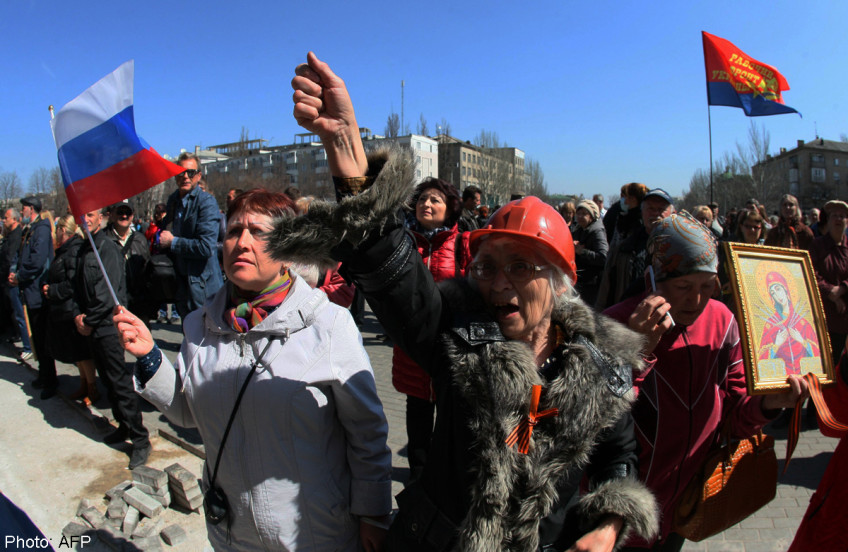Europe sees little chance of diplomatic breakthrough

LONDON - US Secretary of State John Kerry has launched a new round of intense diplomatic talks with Russia as the crisis in Ukraine deepened, with ethnic Russian protesters in three cities holding on to government buildings they occupied earlier in the week to push demands for a regional referendum on independence.
However, officials in most European capitals are gloomy about the chances of any diplomatic breakthrough, for they fear that Ukraine may be about to enter a prolonged and intractable internal crisis.
The pro-Russian protests in Donetsk, Kharkiv and Luhansk - three dusty, Soviet-era industrial cities in eastern Ukraine where ethnic Russians make up much of the population - are not very large, with at most a few hundred people in each case.
Nor is it obvious that the demonstrators are representative of the prevailing opinion in their cities. In an extensive regional opinion poll conducted recently by the International Republican Institute, a US think-tank funded by the American government, 45 per cent of the local respondents expressed a desire to remain within a unified Ukraine and only 5 per cent wanted to become part of Russia. The rest opted for a variety of autonomy schemes.
Yet having confined themselves over the past few weeks to defiant displays of Russian flags, the demonstrators are now much more violent, and their demands more extreme: self-appointed "deputies" have gone as far as proclaiming the "People's Republic of Donetsk" in the hometown of former Ukrainian president Viktor Yanukovych, who was ousted in late February.
The Ukrainian government's claim that many of the rioters are not local and may have been bussed in from as far as Russia for the purpose remains unverifiable, although a comical incident earlier this week - when demonstrators stormed the city opera house in Kharkiv in the mistaken belief that the grand building must be a government installation - does suggest that at least some of the men of violence were unfamiliar with the layout of the cities in which they were protesting.
Yet there is little doubt about Russia's stance: Moscow's state-controlled TV is lavishing attention on the demonstrations, while Russian Foreign Minister Sergei Lavrov claims that the events "indicate the need to respect the aspirations of the residents of southeastern Ukraine… to protect their language, culture and socioeconomic rights".
Although Russia has frequently threatened to use force to protect ethnic Russians in Ukraine and Russian troops continue to be massed within striking distance of all the rioting cities, the assumption among Western security analysts is that the prospect of a further Russian military incursion similar to that undertaken last month in Crimea remains small.
Further confirmation of this view came from Mr Viktor Ozerov, head of the defence and security committee of Russia's Upper House of Parliament, who said yesterday that Russia cannot send "peacekeepers" into Donetsk as the protesters demanded.
Still, the dangers of a miscalculation which leads to a catastrophic spiral of violence remain very high.
Ukraine's interim President Oleksandr Turchynov, who dismisses the unrest as an attempt by Russia to "dismember" his country, has refrained from authorising the use of force against demonstrators.
But he is facing a rising tide of criticism from ordinary Ukrainians, who feel humiliated by their government's apparent impotence.
Should Ukraine's armed forces, currently beefing up their presence in the border provinces, be ordered to evict demonstrators from government buildings, the resulting bloodshed could well bounce Russia into another military intervention.
However, standing still is not an option either, as extreme nationalists in other parts of Ukraine may consider sending their own paramilitaries to confront Russian separatists. In a communique issued yesterday, the Russian Foreign Ministry has alleged that Ukraine is already facing "the outbreak of civil war", an exaggeration which nevertheless may serve Moscow well.
Furthermore, even if violence is avoided this time, ethnic Russian demonstrators are threatening to hold a "referendum" on "independence" from Ukraine on May 11. The Ukrainian government cannot allow this ballot to take place for, if it goes ahead, it would provide the rebellious cities with an excuse not to participate in the all-Ukrainian presidential election scheduled two weeks later, on May 25. And that, in turn, will create a territorial split which could well become irreversible.
Mr Kerry hopes that in his face-to-face meeting with his Russian counterpart, Mr Lavrov, now tentatively pencilled for next week, he may be able to persuade Moscow to "de-escalate" tensions, as US officials like to put it.
But at least for the moment, Russia holds the initiative on the ground. And Moscow appears to believe that keeping Ukraine in a permanent state of tension remains its best option.
Jonathan.eyal@gmail.com
This article was published on April 9 in The Straits Times.
Get a copy of The Straits Times or go to straitstimes.com for more stories.